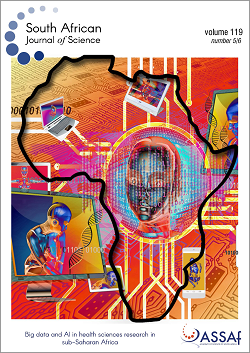Data sharing and data governance in sub-Saharan Africa: Perspectives from researchers and scientists engaged in data-intensive research
DOI:
https://doi.org/10.17159/sajs.2023/15129Keywords:
big data, data governance, sub-Saharan Africa, researchers, scientists, data transfer agreements, data sharingAbstract
The data ecosystem is complex and involves multiple stakeholders. Researchers and scientists engaging in data-intensive research collect, analyse, store, manage and share large volumes of data. Consequently, capturing researchers’ and scientists’ views from multidisciplinary fields on data use, sharing and governance adds an important African perspective to emerging debates. We conducted a descriptive cross-sectional survey and received 160 responses from researchers and scientists representing 43 sub-Saharan African countries. Whilst most respondents were satisfied with institutional data storage processes, 40% indicated that their organisations or institutions did not have a formally established process for storing data beyond the life cycle of the project. Willingness to share data was generally high, but increased when data privacy was ensured. Robust governance frameworks increased the willingness to share, as did the regulation of access to data on shared platforms. Incentivising data sharing remains controversial. Respondents were satisfied with exchanging their data for co-authorship on publications (89.4%) and collaboration on projects (77.6%). However, respondents were split almost equally in terms of sharing their data for commercial gain. Regarding the process of managing data, 40.6% indicated that their organisations do not provide training on best practices for data management. This could be related to a lack of resources, chronic institutional under-investment, and suboptimal research training and mentorship in sub-Saharan Africa. The sustainability of data sharing may require ethical incentive structures to further encourage researchers and scientists. Tangible infrastructure to facilitate such sharing is a prerequisite. Capacity development in data governance for researchers and scientists is sorely needed.
Significance:
Data sharing is necessary to advance science, yet there are many constraints. In this study, we explored factors that promote a willingness to share, as well as constraining factors. Seeking potential solutions to improve data sharing is a scientific and ethical imperative. The standardisation of basic data sharing and data transfer agreements, and the development of a Data Access Committee will strengthen data governance and facilitate responsible data sharing in sub-Saharan Africa. Funders, institutions, researchers and scientists ought to jointly contribute to fair and equitable data use and sharing during and beyond the life cycle of research projects.
Downloads
Published
Issue
Section
License

All articles are published under a Creative Commons Attribution 4.0 International Licence
Copyright is retained by the authors. Readers are welcome to reproduce, share and adapt the content without permission provided the source is attributed.
Disclaimer: The publisher and editors accept no responsibility for statements made by the authors
How to Cite
- Abstract 1834
- PDF 1369
- EPUB 487
- XML 505
- Supplementary material 118
Funding data
-
National Institutes of Health
Grant numbers 1U01MH127704-01












.png)